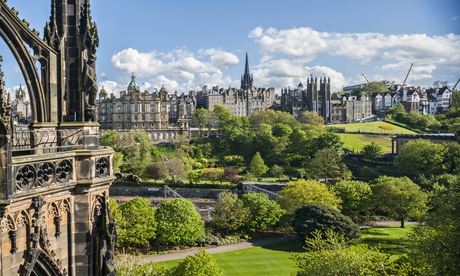2 小時前 · The Telegraph ·
蘇格蘭獨立公投
蘇格蘭即將在9/18舉行獨立公投,過去數個月的民調,「Yes」陣營一直處於落後「No」陣營達百分之二十的劣勢。不過,在經過兩次電視辯論之後,差距逐漸縮小,更在昨天的最後一次民調,贊成獨立的比例,以「51:49」一舉超過反對的比例。使得最後的結果更難預測。
值得特別注意的是,蘇格蘭獨立公投,採取通行的「簡單多數決」(simple majority),任一方取得多數,即決定結果,根本沒有什麼「投票門檻」的限制。
豐富的研究文獻,已清楚地指出,設置投票門檻,不但不會提高投票率,反而會使得投票率下降,更會造成「反方絕對優勢」的不公平結果,違反民主原則。
蘇格蘭的獨立公投,無論結果如何,都值得關注。英國政府即使立場上反對蘇格蘭獨立,仍然以民主的精神、認真的態度,支持本次公投由蘇格蘭人透過公平的規則進行,尊重公投結果,更是值得我們學習。
下次如果再有政客像江宜樺一樣,說出「公投百分之五十投票門檻限制是合理的」這種蠢話,就直接請他回家多讀點書。
當然,最重要的,請大家支持公投法補正的運動,一起奪回我們的憲法權利。
幾個月前,中國的李克強訪問英國,干預其內政:贊成蘇格蘭留在英國。.....這位英格蘭人對蘇格蘭的獨立很同情,贊成蘇格蘭獨立,去建立小而美的國家.....
Scottish independence: A yes vote will produce a leaner, meaner Scotland
The no campaign offers merely stasis. Even with devo max, Scots would remain in political shackles. It’s time to break free

I sit overlooking Cardiff Bay as seven warships, including the destroyer HMS Duncan, manoeuvre gingerly into position. They join an army of 10,000 assorted police and guards to lock down the city so that Nato can eat a banquet in Cardiff castle. Not since the Field of the Cloth of Goldcan such extravagance have masked such impotence. From the castle walls, statesmen hurl empty threats at Russia and Islamic State, who are currently dismembering Ukraine and Iraq, two nations the west claimed only recently to have “liberated”. No one notices that their host, the UK, also faces dismemberment. Nato’s response to a global revolt against over-centralised and insensitive states is to quaff champagne and gobble canapés.
Whatever comes of Scotland’s impending independence referendum, Britain owes that country a vote of thanks. For six months it has staged a festival of democracy, an Edinburgh tattoo of argument. Not a politician, not an airwave, not a town hall, not a wall, tree or road sign is free of the debate. If, as predicted, turnout tops 80%, that is a triumph in itself. Political participation is not dead when it matters.
How would I vote? As a British citizen residing in London, I would vote no. I would be shocked at how England’s rulers have incurred the loathing and distrust first of most of Ireland and then of half of Scotland. This incompetence reached its climax in the no campaign itself, the jeering, patronising, money-obsessed “project fear” designed to warn the Scots to stay close to nurse. The assumption that independence is all about cash is bad enough. Worse have been the expatriate celebrity endorsements – why have they all left home? – and scares that Scotland will lose its monarch, its missiles, its brains and the BBC, getting only poverty and terrorists in return.
I would therefore hope that a no vote might encourage London to seek some new federation for its dependencies in the “first English empire”, picking up on Herbert Asquith’s 1912 “home rule for all”. The shock of the past year might warn the English establishment to embrace constitutional reform. It might put stuffing into David Cameron’s empty localism and avert the humiliation of a collapsed union.
But as a Londoner I have no such vote. I have to go to Edinburgh and imagine myself a Scot. In that case there is no argument. I would vote yes.
I am sure the outcome of the referendum, whichever way it goes, will be nothing like the alarms or promises made by both sides. Pick apart the no vote’s “devo-max” and the yes vote’s “independence-lite”, and the practical differences are not great. Both will deliver a distinctive Scotland yet one still close to England. Whatever deal follows whatever vote, there will be joint citizens, open borders, a common currency, joint banking, arrangements on welfare, security, tax-gathering and broadcasting. Scotland may set its taxes differently, but the scope for drastic change will be limited. It can already raise or lower its income tax but has not dared to do so.
As for money, the issues are fiercely contested and wildly out of line. But the consensus appears to be that the £10.5bn net transfer to Scotland could be roughly balanced by Scotland’s notional oil revenue. An independent Scotland would lose a billion a year in windfarm subsidies from English energy consumers and might have to carry over £100bn of debt. It would certainly be tough, but that is what independence is about. Poll evidence suggests that Scottish voters are unmoved by the no campaign’s economic alarmism, leaving money as a matter for politicians to sort out.
I would vote yes because the no campaign has offered merely stasis. Its leader Alistair Darling’s vision is of union as sole guarantor of prosperity. Yet this paternalism has trapped Scotland in dependency and lack of enterprise for half a century. Nor is it clear what his offer of devo max really means. If Scotland were able to raise more of its own taxes, the risk is that the Treasury would offset them with cuts in the subvention. Scotland might see a more adventurous future, but it would remain in political shackles.
Alex Salmond’s vision is equally flawed. His socialist heaven of tax and spend, floating on a lake of oil, must be rubbish. He offers voters an extra £1,000 a head after independence, when the reality must be public sector belt tightening. Scotland’s budget would lose Treasury underpinning. Its borrowing would be at risk. Its ministers would be on their mettle. Financial crisis would lead to Greek-style austerity, whereupon voters would chuck Salmond out. The Tories might even revive as the party of discipline and offshore capitalism.
I would vote yes because, though I disbelieve both Darling and Salmond, Salmond’s lies would precipitate a crisis that would have to lead to a leaner, meaner Scotland, one bolstered by the well-known advantages of newborn states and more intimate governments. Scotland’s whingeing and blaming of London would stop. It would be driven towards true self-sufficiency, capable of resembling Denmark, Norway, Ireland or Slovakia as a haven for fleet-footed entrepreneurs.
I have lost count of the referendum debates I have attended. They are dominated by expatriate Scots who have no intention of returning home but who enjoy telling Scotland its business from the fleshpots of London. They see union much as their grandparents saw empire, as a historical inevitability to be defended against all argument. Many are blind to the hypocrisy of deploring Britain’s subservience to Brussels yet insisting on Scotland’s subservience to London.
The United Kingdom really ended with the departure of Ireland in 1922. In the past half-century the drift to self-determination has been remorseless. In the 1970s, 40% of Scots saw themselves as “British”; now only 23% do. To them, arguments about currencies, subsidies and oil are not the issue. They have been debating the essence of democracy – by whom should they be ruled? They are arguing constitutions, not spreadsheets.
Most Scots know that independence could only be partial, but half-wish to negotiate it as between sovereign peoples. This craving for ever greater regional autonomy is rampant across Europe, from Spain to the Russian border. It slides into partition only when, as in Yugoslavia, central government is deaf to its demands. Whether or not Scotland votes for independence, it will have made its own decision in its own way. To that extent, it is a sovereign state in embryo.


沒有留言:
張貼留言